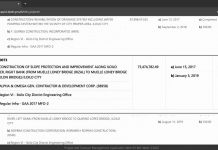MANILA – The House of Representatives’ Ways and Means Committee has approved House Bill 307 or the “Passive Income and Financial Intermediary Taxation Act (PIFITA)” on Tuesday.
The measure particularly aims to:
a) Provide neutrality in the tax treatment across financial institutions and financial instruments
b) Simplify what has become a complex tax system
c) Improve equity across investors and savers
d) Minimize arbitrage opportunities
e) Promote capital market development
and tax competitiveness within the context of financial globalization,
increased mobility, and financial inclusion
The PIFITA is the fourth package of Comprehensive Tax Reform Program (CTRP)
under President Rodrigo Duterte’s administration, according to committee
chairman Joey Salceda (2nd District, Albay).
It complements Republic Act 10963 or the “Tax Reform for Acceleration and Inclusion (TRAIN) Act” by making passive income and financial intermediary taxes simpler, fairer, more efficient, and more regionally competitive.
“There are numerous deficiencies that serve as compelling reasons to undertake tax reform in the financial sector. These deficiencies include complicated tax structure, susceptibility to arbitrage, and inequitable distribution of tax burden,” Salceda said.
“The inclusion of the capital income and financial services of the current administration’s Comprehensive Tax Reform Program provides a window of opportunity to achieve much-needed reform in the financial sector,” he added.
Department of Finance undersecretary Karl Kendrick Chua explained during Tuesday’s hearing that the PIFITA will make the country more competitive within the Southeast Asian region.
“The changes will be revenue neutral in the short term, as some tax rates will be lowered while others are raised,” Chua said. “This is the priority because we need to address the issues in the Tax Code.”
Among the proposals of the PIFITA is the decrease of tax rates on interest income from regular savings and short term deposits from the current 20 percent to 15 percent — 15 percent being the lowest tax on labor income and within the range relative to other states in the region.
Tax rates on interest income from foreign currency deposits and long-term deposits shall both likewise dip to 15 percent. Dividend income shall be fixed at 15 percent except for intercorporate bonds.
Tax rates on proceeds from the sale of listed shares shall be lowered by 0.1 percentage point each year beginning 2020 until 2025, from the current 0.6 percent to 0.1 percent, while tax rates from sale of unlisted shares of stock shall remain the same at 15 percent.
Tax rates on proceeds from the sale of listed debt instruments shall be at 0.1 percent to equalize tax of listed debt and equity instruments. Tax rates on gains from sale of unlisted debt instruments shall be fixed at 15 percent.
Income from interest, commissions, and discounts from lending activities as well as income from financial leasing and other income shall be taxed five percent to harmonize gross receipts tax.
Tax rates for life and health insurance will remain at two percent premium. For HMO, pension, and pre-need insurance, the tax rates shall be slashed to two percent premium tax from 12 percent value-added tax (VAT).
The 12 percent VAT for non-life shall be retained since non-life insurance is a consumption product by nature. Crop insurance shall remain exempt from tax.
The PIFITA also proposes the reform of documentary stamp taxes which shall be lower and expressed in ad valorem in general. This shall decrease friction cost of financial instruments./PN







